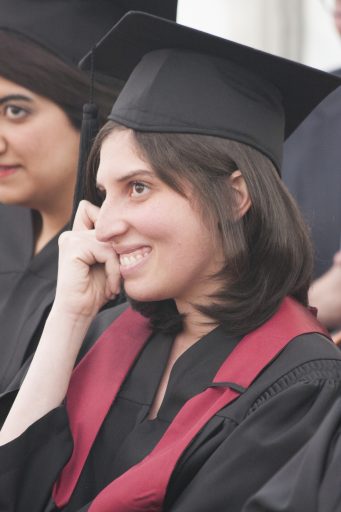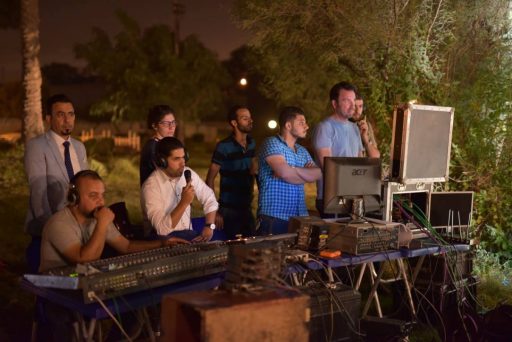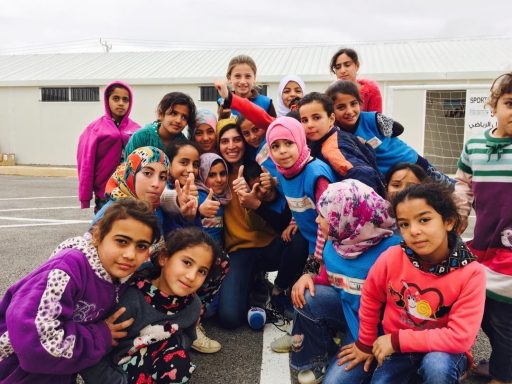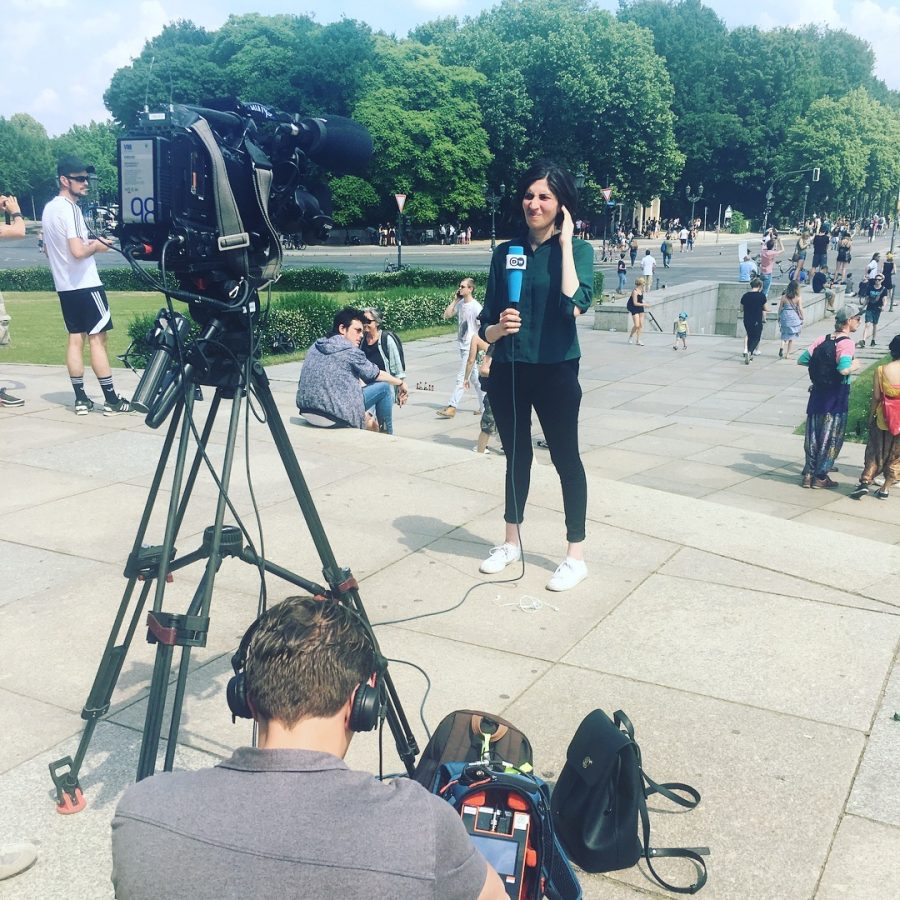I had met Aya Ibrahim (2015 BA alumna) before but was only properly introduced to her work earlier this year when she sat down with a group of current students to talk about transitioning from our liberal arts Pankow campus to the sometimes turbulent world of broadcast journalism.
Confident, well articulated and clear-headed, she sat around a lunch table on the second floor of our cafeteria, walking us through her journalistic tours and the reports that came out of them. Her news stories have taken her every where from Mauritania to Egypt to Lebanon, passing through Jordan, Iraq, Sudan and beyond. She has covered democratic transitions, unemployment, as well as minority and human rights with the post “Arab Spring” generation.
“I was very lucky: I graduated from college and landed in a team made up of the most talented, passionate and dedicated group of people I think I will ever meet. I did almost a dozen tours over two years — an opportunity not many journalists get and certainly not this early on in their careers.”
Aya is referring to her time as Program Coordinator of “ShababTalk,” an award-winning Arabic youth-oriented talk show that has been described as “voice of the youth” for its unwavering fearlessness and proximity to the very group it aims to target.
“At ShababTalk I had the opportunity to navigate stories at the intersection of European and Arab political landscapes, and, more importantly, the opportunity to listen to people.”
She has since moved on from the show and is now a reporter for Deutsche Welle’s flagship DW News. There, she films and edits pieces for television and social media, reports from the ground, and is a frequent studio guest explaining current affairs in the ever-changing Arab region. But, before all of that, she earned a degree in Ethics and Politics from Bard College Berlin in 2015 parallel to working as an assistant at DW and doing a semester abroad with the BGIA program in New York City.
“I learned a lot at school, but Deutsche Welle is where I got my education.”
What she means by this and how her transition from school to journalism happened was the subject of a one-on-one talk I had with Aya earlier this month.

Elena: How has your time at BCB prepared you for professional life? Is there anything about your education at BCB that you would like to point out?
Aya: I think it’s an unfair question to pose to the kind of education you get at BCB. It is not a vocational degree and doesn’t prepare you for a specific career, which is why I chose to study there in the first place. I learned a lot at school, but Deutsche Welle is where I got my education. That doesn’t mean BCB hasn’t to an extent prepared me for it. It’s more about the whole mindset you cultivate at a place like BCB. It is a questions based curriculum, so it opens up the way you think. You become very comfortable with uncertainty, and that’s an invaluable skill for any journalist today.
If I had to pick one thing that was particularly influential, though, I would choose the senior thesis. I wrote my thesis on the Egyptian novel The Yacoubian Building which I tried to understand in terms of contemporary Egyptian politics. When you spend a whole year trying to bridge a novel like this with the now, it becomes a part of how you think after finishing such a lengthy project. I still very much draw inspiration from literature and history and philosophy when pitching news stories, for example — they’re almost always my starting point.
Elena: That’s really interesting; I hope I have a similar experience when writing my thesis this year. What aspects of the open mindset that you say you developed at BCB, along with the things that you took away from writing your thesis, would you say influence the way you do your job now the most?
Aya: Definitely rigor — the rigor with which I try to approach my pieces. When you sit and you write your paper, you have to work very closely with the professor. In my time, we had these one-on-one tutorials with professors where everything you wrote in a paper was challenged; you had no choice but to back it up with evidence, and you really paid attention to what you wrote down. Eventually you create a sort of internal editing mechanism where you’re always questioning what you’re saying.
Journalism and specifically broadcasting is, of course, much more collaborative. You work with a large group of people, you usually have more than one editor – at Deutsche Welle your work will be scrutinized by people who are much more experienced. BCB helped me become comfortable with that scrutiny, with having my ideas challenged in the details of the details.
A video that Aya worked on titled “Between war and politics: A Syrian family’s story”:
Elena: Other than getting this theoretical background and getting accustomed to rigor in your work, I understand that you also had a practical aspect to your education when you went on exchange in New York City and did the BGIA (Bard Globalization and International Affairs) program. Could you talk a little bit about your experience with that program and what you got out of it?
Aya: I had two internships while I was there: one was at the East-West Institute, which is a political think tank. The other was at the International Criminal Court, which is a group of NGOs that tries to spread the message of the court. I did a lot of research in both capacities. The BGIA program is the closest thing to professional life that I got during the entire Bard experience. On top of interning I was studying full time — a schedule like that makes you more resilient. You are able to get into a pace where you work as hard as possible under deadlines. When you are a reporter on the ground, you’re travelling for hours; you don’t have a lot of time. I think that BGIA was good for developing the kind of work ethic that broadcasting usually requires.
Elena: That honestly sounds stressful, but probably worth it. I would like to transition from talking about your experiences at Bard to your job at Deutsche Welle. I would like to ask you how you ended up working for them in the first place.
Aya: I started with a month-long internship in the summer after my first year in 2012. After I finished that, they offered me an assistant position in the Arabic department that I did for three years. I had tasks like making copies for the anchors, helping put together run-downs or accompanying guests in the building. It was a lot of non-editorial work, but I did spend a lot of time in newsrooms and around editors. You would have to be walking around blindfolded with your hands over your ears to not be intrigued by what was happening around you. I would be discussing philosophical texts by Plato or Kant in the morning at school, and then I would have the night shift working on Arabic news. Naturally, you just start drawing links between these two things and thinking about them together.
After I graduated, I got a different job at Deutsche Welle as the online editor for “ShababTalk”, which has since become hugely popular in the Middle East. I quickly became an associate producer for our Arab World Tour. Every month we would go to a different country in the Arab region to record a talk show from the heart of a different city, right where people live, love and struggle — nothing I had done before comes close.

This was a formative experience in many ways. I entered the show at a unique moment in history for both Germany and the Arab region. The summer of 2015 was when the large wave of refugees was coming into Germany. There was a lot of reporting, explaining, and building bridges that needed to be done. I think our show played a role in creating that necessary dialogue between newcomers, German society and policy makers. We were primed to take that role: as an Arabic show based in Germany, we had access to both sides.
2015 was also four years after the so called “Arab Spring”. Between 2011 and 2014 there was euphoria about this great thing that happened to that part of the world, but it was not fully understood. 2015 through 2017 there’s enough distance to look back at it and to start looking at the issues that mattered to young people. Issues like identity and democratic change really started to crystalize in that period. Throughout the tour we also did our part to facilitate these conversations.
Most importantly, I was in a very small but very diverse team who always gave me something to aspire to. I think we did very well for ourselves in the past couple of years, winning multiple awards and establishing a unique place for ShababTalk in a very competitive market. I ended up coordinating the show for a good year and a half and took on a myriad of other tasks.
That’s basically what I did until January 2018. Then I moved within Deutsche Welle to the flagship English language news department, where I produce reports for TV and also for our online portal. It’s a new challenge. Going from a regional format to an international newsroom has opened up many more opportunities for me and I am incredibly happy to be part of it. I also do field assignments, such as the AfD demonstration that happened on the 27th of May.
A video on the re-opening of a school in Mosul after the “Islamic State’s” defeat:
A video that Aya worked on titled “Turkey captures Afrin: What’s next?”:
Elena: I actually saw the report that you did about that particular demonstration and I attended the Gegen-Demo. Would say that there was anything journalistically interesting about it?
Aya: That day gave me a whole other meaning to the word conflict. You had these two different social realities a few meters away from each other. The AfD demonstration on one side, which was a right-wing populist party demonstration, and on the other side was then the Gegen-Demo, which was this huge coalition of different groups who have a different idea or vision for Germany — a more “open” one, as they would put it. The striking differences that were made visible through the two protesting blocks reinforced my belief that well-seasoned journalists will always be necessary to explain these changing realities.
Elena: How would you suggest that journalists provide truthful accounts of difficult situations such as the conflict we witnessed in the streets of Berlin at the end of May?
Aya: I think that the best thing journalists can do is to listen to people. It is something my first boss used to tell me. Try to speak to as many people as possible, just listen to what they have to say and go to the source. Talk to the people who are actually affected by the events you are covering. It’s the simplest way to get to the bottom of something. The best thing right now for journalists is to listen to people: to speak less and listen more.
Aya in DW News’ studio talking about her reporting:
Elena: Lastly, as someone who is considering entering the field of journalism, I have to ask you what you would recommend to aspiring journalists. Would you advise them to go to journalism school? Or would you advise them to learn on the job?
Aya: I don’t think that there is one best way to do it. But here are some things I learned from my experience that you’ll need no matter what: Get very comfortable working in teams. There has never been a report or anything that I have worked on that has aired that has not had at least three to four people involved in it, so you have to be comfortable, even if you don’t like it. As someone who didn’t necessarily have a huge appreciation for group work, this was difficult at first. Also work on your technical skills, because they’ll help you translate your ideas into an actual editorial product. If you like to write, start a blog. If you like to film and edit, start a YouTube channel. I think I could’ve done that much earlier and it definitely would’ve helped.
Of course, I could not speak to the experience of journalism school because I never got to go. I got into Columbia University’s Graduate School of Journalism but didn’t end up going because it was too expensive. In the end, I think it all worked out.

Talking to Aya made me see more clearly how my humanities-based knowledge can transcend academia and enter into the world of truthfully representing people’s everyday narratives, whether they be individual or collective ones. From reading theory, one develops a unique way of understanding and analysing how different social realities materialize. A four-year questions-based curriculum may help equip us to ask the right questions. In the world of journalism, these questions are the ones that help people tell their stories as genuinely as possible in such a way that their answers would urge audiences to critically assess the s conditions that led to and the reasons behind those answers.
I certainly hope I am lucky enough to be able to become that kind of journalist.

